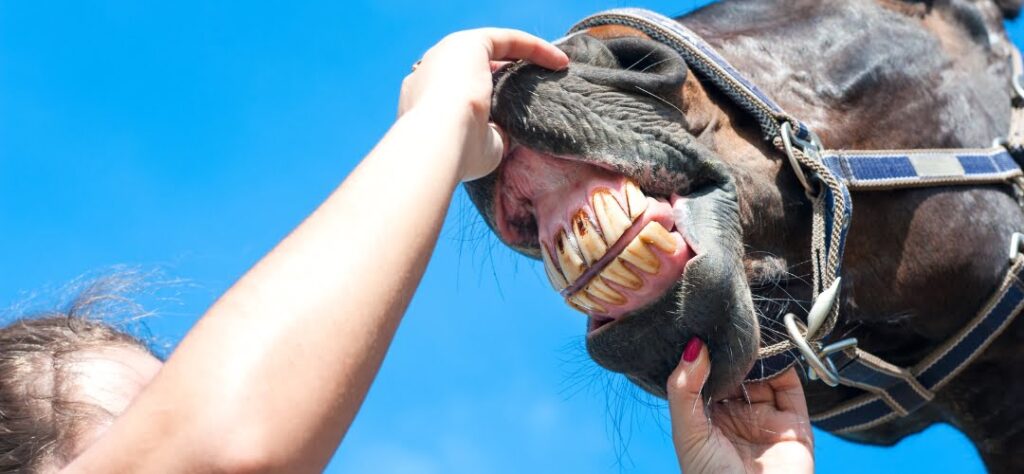As horse owners, we are responsible for ensuring that our beloved companions are happy and healthy. One common issue that can affect a horse’s well-being is dental problems. Just like humans, horses can suffer from dental issues, making it difficult to eat normally. In this article, we will explore the topic of feeding horses with bad teeth and provide you with valuable information to help you navigate this situation.
Feeding a Horse with Bad Teeth
Feeding a horse with bad teeth can be a challenging task, but with some simple adjustments, you can ensure that your horse gets the nutrition it needs. When a horse has dental problems, it may struggle to chew its food properly, leading to weight loss, poor condition, and even behavioral issues. To alleviate these problems, here are some strategies you can implement:
Soaking Hay and Feed
Soaking hay and feed in water is a common practice for horses with dental problems. By doing so, you can soften the food, making it easier for your horse to chew and digest. To soak hay, place it in a clean tub or container and cover it with enough water to completely submerge it. Let it soak for at least two hours. When it’s ready, remove the excess water and offer the softened hay to your horse.
Soaking hay not only makes it easier for your horse to chew, but it also helps to increase hydration. Horses with dental issues may struggle to drink enough water, so providing them with soaked hay can help ensure they stay properly hydrated. Additionally, soaking hay can help reduce the risk of choke, a condition where food becomes lodged in the horse’s esophagus, which is more common in horses with dental problems.
Similarly, concentrates and pellets can be soaked to create a mash-like consistency. This will help your horse consume the necessary nutrients without putting excessive strain on its teeth. Be sure to give your horse soaked feed within a reasonable time to preserve freshness and avoid spoilage.
Providing Alternative Forage Sources
In addition to hay, horses with dental problems can benefit from alternative sources of forage. These can include chopped hay or haylage, which are softer and more easily chewed compared to regular hay. Hay cubes can be offered as an excellent choice of alternative hay, but must be soaked, especially for those horses with dental issues. However, it is important to introduce these alternatives gradually to avoid digestive disturbances.
Chopped hay is a convenient option as it is already cut into smaller pieces, making it easier for your horse to chew. Haylage, which is fermented hay, is another alternative that can be easier for horses with bad teeth to consume. Hay cubes, on the other hand, are compressed blocks of hay that can be soaked or fed dry. They provide a concentrated source of nutrition and are ideal for horses with severe dental issues.
Another option is to provide your horse with pasture turnout if possible. Fresh grass can be an excellent source of nutrition for horses with dental issues, as it is easier to chew and digest. Ensure that the pasture is well-maintained and free from harmful plants to keep your horse safe and healthy.
When turning your horse out to pasture, it is important to monitor their grazing time. Horses with dental problems may have difficulty regulating their intake, leading to weight gain or loss. Consider using a grazing muzzle or limiting your horse’s time on pasture to prevent any negative effects on their overall health.
Signs of Dental Problems in Horses
Identifying dental problems in your horse is crucial for timely intervention and appropriate feeding adjustments. Here are some signs that may indicate dental issues:
- Weight loss or difficulty maintaining weight
- Excessive salivation or drooling
- Odor from the mouth
- Changes in eating behavior, such as dropping food or reluctance to eat
- Head tossing or difficulty accepting the bit
- Undigested food in manure
- Swollen or painful areas around the jaw
If you notice any of these signs, it is important to consult your veterinarian for a thorough dental examination. Regular dental check-ups should also be a part of your horse’s wellness routine to catch any issues before they become severe.
Horses rely on their teeth for a variety of functions, including grazing, chewing, and grinding their food. As herbivores, their teeth are designed to handle the constant wear and tear caused by their diet of fibrous plant material. However, just like humans, horses can experience dental problems affecting their overall health and well-being.
One common dental issue in horses is dental malocclusion, which is abnormal teeth alignment. This can cause the teeth to develop sharp points or hooks, leading to discomfort and difficulty chewing. If left untreated, dental malocclusion can result in weight loss and poor body condition.
Another sign of dental problems in horses is excessive salivation or drooling. This can result from pain or discomfort in the mouth, making it difficult for the horse to swallow properly. Additionally, an unpleasant odor from the mouth can indicate the presence of dental infections or decay.
Changes in eating behavior, such as dropping food or reluctance to eat, can also indicate dental issues. Horses with dental problems may struggle to chew their food effectively, leading to inefficient digestion and nutrient absorption. This can result in weight loss or difficulty maintaining a healthy body weight.
Head tossing or difficulty accepting the bit while ridden can be signs of dental discomfort. Horses with sharp or uneven teeth may experience pain when pressure is applied to the bit, causing them to react by tossing their heads or resisting the rider’s aids.
Undigested food in the horse’s manure can clearly indicate dental problems. If the horse cannot properly chew and break down their food, it may pass through their digestive system without being fully digested. This can lead to nutrient deficiencies and poor overall health.
In some cases, horses with dental issues may develop swollen or painful areas around the jaw. This can result from dental infections or abscesses, which require immediate veterinary attention.
How to Avoid Bad Teeth Issues
Prevention is always better than cure, especially regarding your horse’s dental health. Taking care of your horse’s teeth is essential for their overall well-being. While some dental issues can be unavoidable, there are steps you can take to minimize the risk and ensure your horse has a healthy smile.
Maintain Regular Dental Examinations: One of the most important steps in preventing dental issues is to work with your veterinarian to establish a schedule for dental check-ups. Regular examinations allow for early detection and treatment of any dental problems. Your veterinarian will be able to identify issues such as sharp points, hooks, or abnormalities in your horse’s teeth.
Provide Regular Dental Care: Regular dental floating or filing prevents sharp points and hooks from forming in your horse’s teeth. Floating involves using specialized tools to smooth out rough edges and remove dental abnormalities. You can prevent discomfort and potential dental issues by keeping your horse’s teeth properly aligned.
Offer a Balanced Diet: A well-balanced diet is essential for your horse’s overall dental health. A fiber-rich diet, such as hay or grass, promotes natural chewing behavior and helps maintain healthy teeth. Additionally, appropriate nutritional supplements can support your horse’s dental health and ensure they receive all the nutrients for strong teeth and gums.
Encourage Chew Toys: Like humans, horses have a natural instinct to chew. Providing your horse with appropriate chew toys can promote natural chewing behavior and help keep their teeth in good condition. Chew toys also provide entertainment and help prevent boredom, which can lead to destructive chewing habits.
Pasture Turnout: Regular access to pasture grazing allows for natural wear and tear of the teeth as horses graze. The act of grazing helps to naturally wear down the teeth, reducing the risk of sharp points or other dental abnormalities. It also provides mental stimulation and allows horses to behave naturally.
Regularly Clean Water Buckets: Proper hydration is essential for your horse’s overall health and dental health. Ensure that your horse has clean, fresh water at all times. Regularly cleaning and inspecting water buckets can prevent the buildup of harmful bacteria, which can lead to dental and other health problems.
Feeding a horse with bad teeth requires some adjustments and considerations. Soaking hay and feeds, providing alternative forage sources, and proactively identifying dental issues are crucial steps in supporting your horse’s well-being. Additionally, implementing preventive measures can help minimize the risk of developing dental problems. Always consult your veterinarian for specific dietary recommendations and guidance tailored to your horse’s needs. Remember, by prioritizing your horse’s dental health, you safeguard its overall health and happiness.


